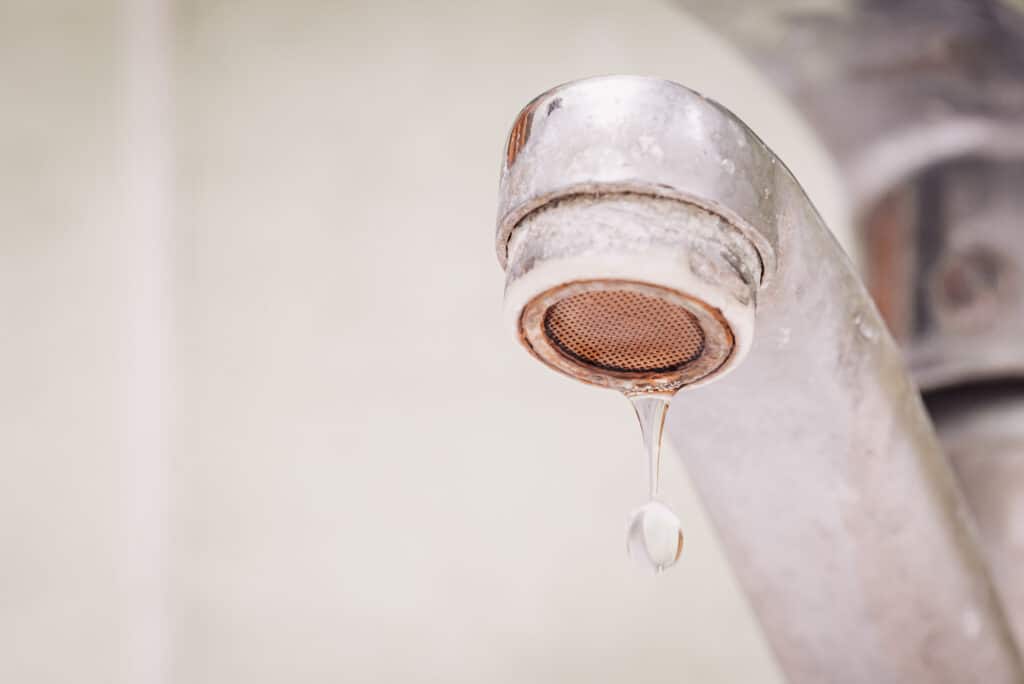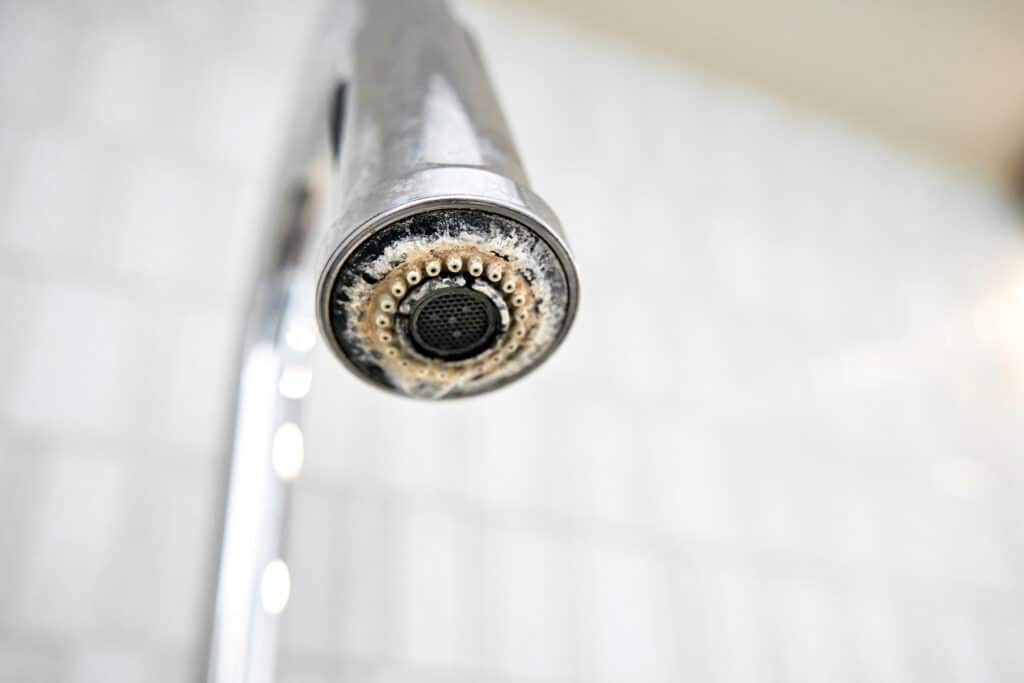
Effects on Your Home and Health, Plus Solutions
Have you been struggling with hard water issues in your home?
Hard water is water that contains high levels of dissolved minerals, predominantly calcium and magnesium ions.
These minerals are picked up as water percolates through limestone, chalk, or gypsum deposits.
The chemical formula for these compounds includes calcium carbonate (CaCO₃) and magnesium hydroxide (Mg(OH)₂), which are responsible for the hardness of the water.
Causes of Hard Water
The hardness of water largely depends on the geology of the region.
Groundwater, which moves through soil and rock, dissolves naturally occurring minerals.
This process leads to higher concentrations of calcium and magnesium, making the water hard.
Regions with significant limestone or chalk deposits typically have harder water due to the abundance of these minerals.
Regional Variations
In the United States, the hardness of water can vary widely from one region to another.
For instance, water in the Midwest and Western parts of the country tends to be harder due to the geological formations in these areas.
Conversely, areas with fewer mineral deposits may have softer water.
Conversely, areas with fewer mineral deposits, such as certain parts of the Northeast and Pacific Northwest, often have softer water.
In these regions, the geological formations do not contain as much calcium and magnesium, leading to lower concentrations of these minerals in the water supply.
Consequently, the water does not accumulate as many hardness ions as it travels through the ground, resulting in softer water that is less likely to cause scale buildup in plumbing systems and appliances.

Effects of Hard Water
Impact on Plumbing Systems
Hard water causes significant problems for household plumbing.
The calcium and magnesium ions in hard water can lead to the formation of scale, a hard, chalky deposit that builds up inside pipes and on fixtures.
Over time, this scale can reduce water flow and increase pressure on your plumbing system.
In water heaters, scale acts as an insulating layer, reducing efficiency and increasing energy costs.
The heating elements must work harder to heat water, leading to higher energy consumption and shorter lifespan for appliances.
Cleaning and Laundry Challenges
Hard water can make daily chores more difficult and less effective.
Soap Efficiency
When soap is used with hard water, it reacts with the calcium and magnesium ions to form a precipitate known as soap scum.
This reduces the soap’s ability to lather and clean effectively.
You may find that you need to use more soap or detergent to achieve the same cleaning power you would get with soft water.
Laundry Issues
Fabrics washed in hard water can feel stiff and look dull.
The minerals in hard water can embed in the fabric, reducing the effectiveness of laundry detergents and leaving clothes looking dingy and worn out.
Additionally, these mineral deposits can cause wear and tear on your washing machine, leading to more frequent repairs or replacements.
Health Considerations
While hard water is generally safe to drink, it can have minor health implications.
Mineral Intake
Hard water can be a source of beneficial minerals like calcium and magnesium, which are essential for maintaining healthy bones and teeth.
The World Health Organization (WHO) suggests that drinking water may be a significant source of these minerals in your diet.
However, excessive hardness can lead to skin irritation, particularly in people with sensitive skin, as the minerals can leave a residue that clogs pores and exacerbates conditions like eczema.

The Science Behind Hard Water
Understanding Water Hardness Levels
Water hardness is measured by the concentration of calcium and magnesium ions in the water.
It is typically expressed in milligrams per liter (mg/L) or parts per million (ppm) of calcium carbonate (CaCO₃).
The U.S. Geological Survey classifies water hardness as follows:
- Soft: 0-60 mg/L
- Moderately Hard: 61-120 mg/L
- Hard: 121-180 mg/L
- Very Hard: Over 180 mg/L.
These levels help in determining the degree of hardness and the appropriate treatment methods needed for household and industrial applications.
Formation of Hard Water
The formation of hard water is a natural process that begins with the water cycle.
As rainwater falls, it seeps through soil and rock, dissolving minerals along the way.
When water moves through limestone, chalk, or gypsum deposits, it absorbs calcium and magnesium, resulting in hard water.
Solutions for Hard Water
Water Softening Techniques
Are you tired of dealing with the negative effects of hard water in your home?
There are several effective methods to soften hard water, making it more suitable for household use.
Ion Exchange Process
One of the most common and effective methods for softening hard water is through ion exchange.
This process involves water softeners that use ion-exchange resins to replace calcium and magnesium ions with sodium or potassium ions.
When hard water passes through the resin beads in the softener, the calcium and magnesium ions are exchanged for sodium or potassium ions, resulting in softened water that won’t form scale or soap scum.
Salt-Free Water Conditioners
For those looking for a salt-free alternative, water conditioners using template-assisted crystallization (TAC) technology are a viable option.
These devices convert hardness ions into stable crystals that do not adhere to surfaces, preventing scale formation without adding sodium or potassium to the water.
This method is environmentally friendly and requires less maintenance compared to traditional water softeners.
DIY Solutions and Maintenance
While professional solutions are highly effective, there are also simple DIY methods to mitigate the effects of hard water.
Vinegar Treatment
Regular cleaning with vinegar can help dissolve mineral deposits in appliances like coffee makers, dishwashers, and washing machines.
The acidity of vinegar breaks down the mineral build-up, making it easier to rinse away.
This simple maintenance step can prolong the life of your appliances and improve their efficiency.
Magnetic and Electronic Descalers
These devices work by altering the electromagnetic properties of the minerals in hard water.
Magnetic and electronic descalers do not remove the minerals but change their structure, preventing them from forming hard-scale deposits.
They are easy to install and require minimal maintenance, making them a convenient option for homeowners.
Benefits of Hard Water
Nutritional Value
While hard water can be a nuisance in terms of household maintenance, it also has potential health benefits.
The minerals in hard water, such as calcium and magnesium, are essential for maintaining strong bones and teeth, and for proper muscle and nerve function.
According to the World Health Organization (WHO), hard water can contribute to daily mineral intake, which is particularly beneficial for individuals who might not get enough of these nutrients from their diet alone.
Environmental Considerations
Hard water can be less corrosive than soft water, making it a better choice for reducing lead and copper levels in water supplies.
Additionally, some studies suggest that hard water might be less likely to leach heavy metals from plumbing materials.
Challenges of Hard Water
Impact on Appliances and Plumbing
Hard water can lead to significant wear and tear on household appliances and plumbing systems.
The scale buildup caused by hard water reduces the efficiency of water heaters, dishwashers, and washing machines, leading to higher energy bills and more frequent repairs.
Laundry and Cleaning Issues
Hard water can interfere with the cleaning action of soap and detergent, causing laundry to look dingy and feel rough.
It can also leave soap scum in bathtubs and sinks, making cleaning more difficult and time-consuming.
Professional Services for Hard Water Treatment
For residents in Florence, SC, and Quinby, SC, dealing with hard water issues can be effectively managed with the expert services provided by Benjamin Franklin Plumbing.
The company offers a range of professional water testing and customized water treatment solutions tailored to meet the specific needs of local households. Here’s an in-depth look at their services:
Water Testing
Understanding the precise composition of your water is the first step in addressing hard water problems.
Benjamin Franklin Plumbing offers comprehensive water testing services that measure the hardness level and identify other potential contaminants.
This detailed analysis is crucial for determining the most effective treatment approach.
Their testing process includes:
- Sampling and Analysis: Collecting water samples from various points in your home to get an accurate measure of water hardness and other mineral content.
- Detailed Report: Provide a comprehensive report that outlines the findings, including levels of calcium, magnesium, and any other dissolved minerals.
- Customized Recommendations: Based on the test results, they recommend specific treatment solutions tailored to your water quality issues.
Installation of Water Softeners
Benjamin Franklin Plumbing specializes in installing high-quality water softeners that cater to different household needs.
Their installation services include:
- Ion Exchange Water Softeners: These systems are highly effective at removing calcium and magnesium ions from the water. The process involves exchanging these hardness ions with sodium or potassium ions, resulting in softer water that is less likely to cause scale buildup.
- Salt-Free Water Conditioners: For those who prefer a salt-free option, these systems use template-assisted crystallization (TAC) to convert hardness ions into harmless crystals that do not form scale. This method is beneficial for those concerned about sodium intake or environmental impact.
- Professional Installation: Ensuring that the systems are installed correctly and efficiently to maximize their effectiveness and longevity. Their technicians are trained to handle complex installations and provide seamless integration with your existing plumbing.
Maintenance and Support
Maintaining water-softening systems is crucial for their long-term efficiency and performance.
Benjamin Franklin Plumbing offers ongoing maintenance services, which include:
Regular Inspections: Routine checks to ensure that the water softener or conditioner is functioning correctly. This includes inspecting the resin bed, checking the salt levels, and ensuring the system is regenerating properly.
System Cleaning: Periodic cleaning of the system to remove any accumulated sediments or contaminants that might affect performance.
Repairs and Upgrades: Addressing any issues promptly and providing upgrades to enhance the system’s efficiency as new technologies become available.
Customer Support: Offering reliable customer support to answer any questions or concerns you might have about your water treatment system. Their team is always available to provide assistance and ensure that your system continues to operate at peak performance.
By leveraging the expertise of Benjamin Franklin Plumbing, residents of Florence, SC, and Quinby, SC can effectively manage hard water issues.
Ensuring better water quality and protecting their household appliances and plumbing systems.
Their comprehensive services, from testing to installation and maintenance, provide a holistic approach to tackling hard water problems.
Local Context and Resources
Hard Water in Florence, SC, and Quinby, SC
Living in Florence, SC, or Quinby, SC, you may have experienced the common issues associated with hard water.
Let’s explore the local impact and how you can address it with the help of Benjamin Franklin Plumbing.
Regional Water Quality
The water hardness in Florence and Quinby, SC, varies due to the local geological conditions.
Groundwater in these areas often contains higher levels of calcium and magnesium, contributing to the hardness of the water.
As water moves through the limestone-rich soil and rock, it picks up these minerals, resulting in hard water that affects homes and businesses alike.
Local Solutions
Benjamin Franklin Plumbing of Florence, SC, offers comprehensive water testing and treatment services to help residents manage hard water issues.
Their team of experts can analyze the water quality in your home and recommend the best solutions tailored to the local conditions.
Whether it’s installing a traditional ion-exchange water softener or a salt-free water conditioner, they provide reliable and effective options to ensure your water is soft and safe for daily use.
Professional Water Testing
Understanding the exact hardness of your water is crucial in choosing the right treatment method.
Benjamin Franklin Plumbing offers professional water testing services to accurately measure the mineral content in your water.
This detailed analysis helps in customizing a solution that effectively addresses your specific hard water problems.
Customized Water Softening Systems
Based on the water test results, Benjamin Franklin Plumbing can install a customized water-softening system that fits your needs.
Their expertise ensures that the system is correctly installed and maintained, providing you with consistent soft water that protects your plumbing and enhances your daily life.
Conclusion
Dealing with hard water is a common issue in many households, particularly in regions like Florence, SC, and Quinby, SC, where the local geology contributes to higher levels of calcium and magnesium in the water supply.
Understanding the impact of hard water and implementing effective solutions can greatly improve your home’s water quality and the longevity of your plumbing systems and appliances.
Benjamin Franklin Plumbing of Florence, SC, offers expert solutions to help manage and mitigate the effects of hard water.
Their comprehensive water testing services provide precise measurements of water hardness, allowing for customized treatment solutions.
By installing a tailored water softening system, you can protect your plumbing, enhance the efficiency of your water heaters, and improve the overall quality of your water for daily use.
Trusting professionals to handle your hard water issues ensures a reliable and efficient approach to maintaining a problem-free home environment.
FAQs
-
What is hard water?
Hard water is water that contains high levels of dissolved minerals, primarily calcium and magnesium. These minerals are typically picked up as water moves through limestone and chalk deposits. Hard water can lead to various household issues, including scale buildup in pipes and reduced efficiency of soaps and detergents.
-
How can I tell if I have hard water?
Common signs of hard water include white spots on dishes and glassware, scale buildup on faucets and showerheads, and soap that doesn’t lather well. You might also notice that your laundry feels stiff or looks dingy after washing. For an accurate assessment, professional water testing by services like Benjamin Franklin Plumbing can measure the exact hardness of your water.
-
Is hard water harmful to my health?
Hard water is generally safe to drink and can provide essential minerals like calcium and magnesium, which are beneficial for health. The World Health Organization (WHO) acknowledges that hard water can contribute to dietary mineral intake. However, very hard water may cause minor skin irritations and make it difficult to maintain clean household surfaces and appliances.
-
What are the best solutions for treating hard water?
Effective solutions for treating hard water include ion-exchange water softeners, which replace calcium and magnesium ions with sodium or potassium ions, and salt-free water conditioners, which use template-assisted crystallization (TAC) to prevent scale formation without adding sodium to the water. Both methods have their advantages and can be tailored to your specific needs.
-
How can I get my water tested for hardness?
To get your water tested for hardness, contact a professional plumbing service like Benjamin Franklin Plumbing of Florence, SC. They offer comprehensive water testing services that measure the mineral content in your water and provide detailed analysis and customized treatment solutions. Professional testing ensures accurate results and effective solutions for managing hard water.
Have you experienced issues with hard water in your home? Share your challenges and solutions in the comments below!
Mon–Sat | 8:00 am–5:00pm 24/7 Emergency Service






